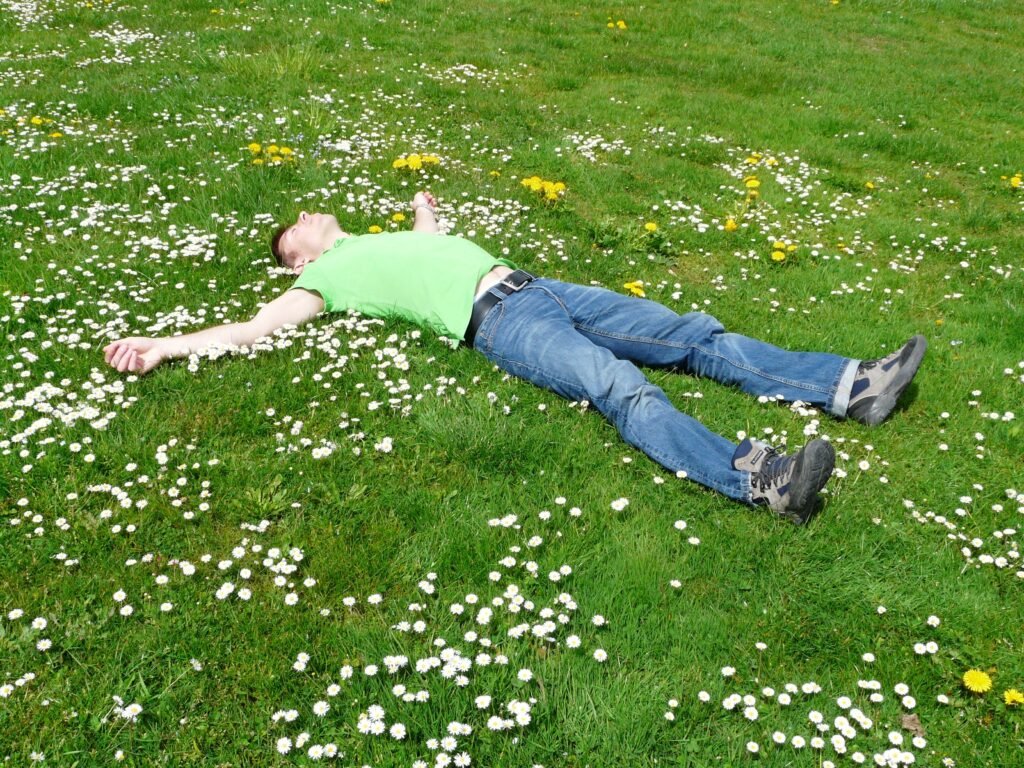Imagine a world where stress slowly fades away, replaced by a sense of calm and tranquility. Practicing Mindfulness-based Stress Reduction (MBSR) offers a path towards this idyllic reality. By cultivating a state of mindfulness, MBSR allows you to tap into your inner peace, giving you the tools to navigate life’s challenges with ease. In this article, we will explore how the practice of MBSR contributes to relaxation, allowing you to experience a newfound sense of calm and serenity in your daily life.

Overview of Mindfulness-based Stress Reduction (MBSR)
Definition of MBSR
Mindfulness-based Stress Reduction (MBSR) is a program that combines mindfulness meditation, body awareness, and yoga to help individuals manage stress, reduce anxiety, and improve overall well-being. Developed in the late 1970s by Dr. Jon Kabat-Zinn, MBSR has since gained recognition as an evidence-based approach to stress reduction.
Origins of MBSR
MBSR was initially developed at the University of Massachusetts Medical Center as a way to help patients manage chronic pain and stress-related conditions. Dr. Jon Kabat-Zinn recognized the need for a non-pharmacological approach to address the physical and psychological symptoms associated with stress and developed a program that integrated mindfulness practices to cultivate present-moment awareness and non-judgmental acceptance.
Principles and techniques of MBSR
MBSR is grounded in several key principles and techniques that form the foundation of the program. These include mindfulness meditation, body scan, gentle yoga, and integrating mindfulness into daily life. By practicing these techniques, individuals are encouraged to develop a greater sense of self-awareness, enhance their ability to cope with stress, and cultivate a more compassionate and accepting attitude towards themselves and others.
Understanding Relaxation
Definition of relaxation
Relaxation refers to a state of physical and mental calmness, free from tension, stress, and anxiety. It is characterized by a sense of ease, tranquility, and a decreased arousal of the body’s stress response.
Benefits of relaxation
Relaxation offers numerous benefits to both the mind and body. It can help reduce muscle tension, lower heart rate and blood pressure, enhance cognitive functioning, improve sleep quality, and promote overall well-being. Additionally, relaxation techniques have been shown to combat the negative effects of chronic stress, such as anxiety, depression, and immune system dysfunction.
Physiological and psychological aspects of relaxation
Relaxation involves both physiological and psychological aspects. Physiologically, it activates the parasympathetic nervous system, leading to a decrease in stress hormones such as cortisol and an increase in feel-good neurotransmitters like serotonin and dopamine. Psychologically, relaxation promotes a sense of calmness, clarity of mind, and a regenerative state that allows individuals to replenish their mental and emotional resources.

Mindfulness Practice in MBSR
What is mindfulness?
Mindfulness is the practice of intentionally bringing one’s attention to the present moment without judgment. It involves being fully aware of one’s thoughts, emotions, bodily sensations, and surrounding environment, fostering a state of non-reactive awareness.
Role of mindfulness in MBSR
Mindfulness plays a central role in MBSR, serving as the vehicle for stress reduction and promoting relaxation. By cultivating mindfulness, individuals learn to observe their thoughts and emotions without being consumed by them, leading to a reduction in the habit of automatic reactions to stressors. Engaging in mindfulness practices helps individuals develop a greater capacity for self-regulation, emotional resilience, and a more compassionate relationship with themselves.
Components of mindfulness practice
Mindfulness practice in MBSR includes various techniques such as formal sitting meditation, body scan, mindful movement (yoga), and informal practices like mindful eating, walking, or washing dishes. These practices are designed to cultivate present-moment awareness, deepen the connection with bodily sensations, and develop a non-judgmental attitude towards one’s experience.
Mindfulness and Stress Reduction
Effects of stress on the mind and body
Stress has profound effects on both the mind and body. Chronic stress can lead to physical health problems like cardiovascular disease, weakened immune function, and digestive disorders. It can also impact mental health, causing symptoms of anxiety, depression, sleep disturbances, and cognitive impairments.
Mechanisms of stress reduction through mindfulness
Mindfulness-based stress reduction contributes to relaxation by engaging several mechanisms. Firstly, mindfulness helps individuals become more aware of their stressors and patterns of reactivity, allowing them to respond to stress in a more skillful and less automatic manner. Additionally, mindfulness cultivates a sense of acceptance and non-judgment towards stressors, which reduces the emotional reactivity and resistance often associated with stress.
Clinical evidence supporting mindfulness for stress reduction
Numerous studies have demonstrated the effectiveness of MBSR in reducing stress and promoting relaxation. Research has shown that participation in MBSR programs leads to significant reductions in perceived stress levels, improvements in coping strategies, and increased overall well-being. Moreover, MBSR has been shown to have lasting effects, with participants reporting continued benefits even months after completing the program.

Promoting Relaxation Through Mindfulness
Calming the mind
One of the primary ways mindfulness promotes relaxation is by calming the mind. By bringing attention to the present moment and observing thoughts without judgment, individuals can create a mental space that is free from worry, rumination, and anxiety. This shift in focus allows for a sense of calm and relaxation to emerge.
Increased awareness of bodily sensations
Mindfulness practice also enhances awareness of bodily sensations, which can be a useful tool for promoting relaxation. By paying attention to the physical sensations associated with stress (such as tension in the muscles or a racing heart), individuals can take proactive steps to alleviate these symptoms through relaxation techniques like deep breathing or progressive muscle relaxation.
Promoting emotional regulation
Mindfulness helps individuals develop emotional regulation skills by cultivating an attitude of non-judgment and acceptance towards their emotions. Rather than reacting impulsively to challenging emotions, individuals learn to observe them with curiosity and compassion. This increased emotional awareness and regulation contribute to a greater sense of relaxation and well-being.
Enhancing self-compassion
The practice of mindfulness encourages self-compassion, which plays a vital role in relaxation. Through the cultivation of self-compassion, individuals can develop an understanding and accepting attitude towards themselves, even during moments of stress or difficulty. This self-compassion creates a nurturing and supportive inner environment that promotes relaxation and well-being.
Reducing rumination and negative thinking
Mindfulness practice helps individuals break free from the pattern of rumination and negative thinking that often accompanies stress. By developing a non-judgmental attitude towards thoughts and learning to let go of the attachment to negative narratives, individuals can experience a sense of relief and relaxation.
Psychological Benefits of MBSR
Improving mental well-being
Participating in MBSR has been shown to improve overall mental well-being. Research suggests that MBSR can enhance positive emotions, increase life satisfaction, and decrease symptoms of psychological distress, such as anxiety and depression. By promoting relaxation and resilience, MBSR contributes to a more positive and balanced mental state.
Reducing symptoms of anxiety and depression
MBSR has been extensively studied for its effectiveness in reducing symptoms of anxiety and depression. By cultivating mindfulness and promoting relaxation, individuals learn to better manage the impacts of anxiety and depression, leading to a greater sense of calmness and well-being.
Enhancing overall resilience
Resilience refers to the ability to adapt and cope with stress, adversity, and life’s challenges. Through the cultivation of mindfulness and relaxation, MBSR helps individuals build resilience by promoting a non-reactive, accepting mindset and equipping them with effective stress management tools. This increased resilience allows individuals to bounce back more quickly from stressful situations and maintain a sense of balance and well-being.
Physiological Benefits of MBSR
Lowering blood pressure
One of the physiological benefits of MBSR is its ability to lower blood pressure. Research has shown that regular practice of mindfulness meditation can lead to a reduction in systolic and diastolic blood pressure, reducing the risk of cardiovascular problems.
Reducing heart rate variability
Heart rate variability (HRV) is a measure of the variability in the time interval between heartbeats. Higher HRV is associated with better cardiovascular health and lower levels of stress. Studies have indicated that MBSR can improve HRV, indicating a positive impact on heart health and stress reduction.
Enhancing immune function
Chronic stress can impair the immune system, leading to an increased susceptibility to illness and slower healing. MBSR has been found to enhance immune function by reducing stress levels and promoting relaxation. This improvement in immune function can contribute to better overall health and well-being.
Improving sleep quality
Sleep disturbances are a common symptom of stress and can contribute to further problems with physical and mental health. MBSR has been shown to improve sleep quality by promoting relaxation and reducing symptoms of anxiety and insomnia. This improved sleep quality allows individuals to wake up feeling refreshed and rejuvenated.
Neurobiological Effects of MBSR on Relaxation
Changes in brain structure and function
Studies using neuroimaging techniques have demonstrated that MBSR can lead to structural and functional changes in the brain. Regular mindfulness practice has been associated with increased gray matter density in areas related to emotion regulation, attention, and self-awareness. These changes contribute to the development of a brain that is more resilient to stress and more supportive of relaxation.
Modulation of stress response in the brain
Stress activates the amygdala, a brain region responsible for the processing of fear and stress responses. MBSR has been found to modulate the amygdala’s response to stress, leading to decreased activation and a reduced stress response. This modulation contributes to the relaxation and stress reduction effects of mindfulness practice.
Activation of the relaxation response
Mindfulness practice activates the relaxation response, a state characterized by decreased physiological arousal and an increased sense of calm. This response counters the body’s stress response, promoting relaxation, and inducing a state of physical and mental well-being.
Regulation of emotions and stress-related neurotransmitters
MBSR has been found to regulate emotions by modulating the activity of stress-related neurotransmitters such as cortisol and serotonin. Through mindfulness practice, individuals can reduce cortisol levels, leading to decreased stress and enhanced emotional regulation. Additionally, regular practice of MBSR has been associated with increased serotonin production, contributing to improved mood and relaxation.
Contextual Factors Influencing MBSR’s Contribution to Relaxation
Commitment and consistency in practice
The benefits of MBSR and its contribution to relaxation are strongly influenced by an individual’s commitment and consistency in practice. Regular and sustained engagement with mindfulness practice is crucial for reaping the full benefits of MBSR.
Supportive environment and group dynamics
Participating in MBSR within a supportive environment and group setting can enhance relaxation and stress reduction. Sharing experiences and challenges with others, as well as receiving guidance from qualified instructors, fosters a sense of community and accountability that can motivate individuals to continue their practice and achieve a greater sense of relaxation.
Integration of mindfulness into daily life
Integrating mindfulness practice into daily life is essential for sustaining the benefits of MBSR and promoting relaxation. By applying mindfulness skills in various contexts and activities, individuals can cultivate a more mindful and relaxed approach to everyday challenges, enhancing overall well-being.
Practical Tips for Incorporating MBSR into Daily Routine
Starting with short meditation sessions
If you’re new to mindfulness practice and MBSR, it’s helpful to start with short meditation sessions. Begin with just a few minutes each day and gradually increase the duration. This gradual approach allows for the development of a sustainable habit without feeling overwhelmed.
Implementing mindful activities throughout the day
Incorporating mindful activities throughout the day can help reinforce relaxation and promote a mindful way of living. Engage in activities such as mindful eating, mindful walking, or mindful listening to cultivate present-moment awareness and relaxation.
Using MBSR apps and resources
Utilize MBSR apps and online resources to support your practice. These resources often provide guided meditations, mindfulness exercises, and educational materials to enhance your understanding and application of MBSR techniques.
Seeking guidance from qualified instructors
Consider seeking guidance from qualified MBSR instructors to deepen your practice and ensure proper technique. Instructors can offer personalized guidance, answer questions, and provide support on your journey towards relaxation and stress reduction.
By incorporating MBSR into your daily routine and consistently engaging in mindfulness practices, you can tap into the powerful benefits of relaxation, improve your overall well-being, and effectively manage stress.
